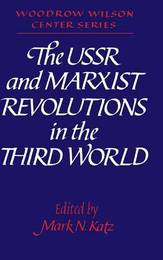
|
The USSR and Marxist Revolutions in the Third World
Hardback
Main Details
| Title |
The USSR and Marxist Revolutions in the Third World
|
| Authors and Contributors |
Edited by Mark N. Katz
|
| Series | Woodrow Wilson Center Press |
|---|
| Physical Properties |
| Format:Hardback | | Pages:164 | | Dimensions(mm): Height 238,Width 160 |
|
| ISBN/Barcode |
9780521392655
|
| Classifications | Dewey:327.4701724 |
|---|
| Audience | | Professional & Vocational | |
|---|
| Illustrations |
Worked examples or Exercises
|
|
Publishing Details |
| Publisher |
Cambridge University Press
|
| Imprint |
Cambridge University Press
|
| Publication Date |
22 February 1991 |
| Publication Country |
United Kingdom
|
Description
What does Mikhail Gorbachev's policy of perestroika mean for future Soviet support of Marxist revolution in the third world? In this timely book, four experts on Soviet relations with the third world take a sharp-eyed look at the role the Soviet Union has played in providing assistance to Marxist revolutionaries and assess the changes in policy that have occurred under Gorbachev's leadership. Throughout the Cold War, the United States and other Western nations regarded Soviet support of revolutions in developing countries as a serious threat to Western security interests. Yet the Soviet Union learned that it could not successfully initiate revolution in other countries; at best, it could only assist revolutionary groups that rose up against existing governments. Even then, the success of revolution in third-world countries was by no means guaranteed. Often the Soviet Union pursued a patient strategy of providing relatively limited amounts of military assistance to revolutionary movements to ensure that they would not be defeated. Even when revolutionaries were able to seize power without a surge of Soviet military support, the Marxist movements often required substantial military assistance from the USSR and other communist states to stay in power. Under Gorbachev, the Soviet government realized that its previous support for revolution had saddled it with the burden of propping up weak Marxist regimes and had undermined efforts to achieve detente with the United States. To accomplish his more important domestic and foreign policy goals, Gorbachev acted to reduce the political and economic cost of supporting existing Marxist third-world regimes, but in a way designed to avoid their immediate overthrow. Nevertheless, the future course of Soviet policy toward Marxist revolutions in third-world countries has not been carved in stone. Just as previous Soviet support for revolution ebbed and flowed at various times, the current Soviet dispermanent, especially if Gorbachev succeeds in implementing perestrokia. Because the authors do not share a common perspective, their essays offer a detailed and challenging analysis of the complexities that have defined the Soviet Union's support of Marxist revolutions in the past and that will shape Soviet policy in the future.
Reviews'Since he came to power in the mid-1980s, Mikhail Gorbachev has indicated that he wants to reduce the resource drain on the USSR and its allies in defending ... weak Marxist-Leninist regimes. Nevertheless, Marxist revolution in the third world has been a persistent phenomenon of the twentieth century, and it could remain so into the twenty-first. It is important to understand the past relationship between the USSR and Marxist revolution in order to understand how this relationship might evolve in the future.' Mark N. Katz
|